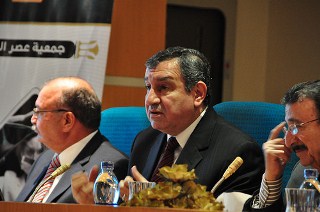Egyptian PM in Ethiopia marking new era in bilateral relations
By Tesfa-Alem Tekle
May 13, 2011(ADDIS ABABA) – Egyptian Prime Minister, Essam Sharaf, arrived in the Ethiopian capital on Thursday for talks with senior government officials as part of the efforts to end the Nile water crises and for talks on a number of other bilateral issues.

Following the discussion Sharaf said a new chapter has opened in relations between Egypt and Ethiopia to work in partnership for mutual development.
“What we are looking for is development in both countries [Ethiopia and Egypt] . Every country has the right to development and the development in Ethiopia is absolutely helpful to Egypt and vice versa’’ he told journalists. He said the new government in Egypt will now on pave the way for new cooperation not only with Ethiopia but also with other countries of the African continent.
“We had in previous passive and remote-based cooperation with African countries. What we are talking about now is a whole development plan that emphasizes our interest and new approach in cooperation with all African countries […] No one can stop the Nile Basin countries from cooperating and seeking joint development,” said Sharaf.
A number of agreements on expanding economic, trade and investments between Egypt and Ethiopia are expected to be signed following his two day visit in Addis Ababa.
The latest visit by the Egyptian Prime minister is an extension visit of a 48-member Egyptian public diplomacy delegation recently visited Ethiopia and returned home with a pledge from Ethiopian Prime Minister that Addis Ababa will postpone ratification of a treaty on sharing Nile River water until a new government in Egypt takes office.
The new government in Egypt has ushered a new and promising relationship with Ethiopia after the North African country saw its long-time President Hosni Mubarak swept away from power last February in a popular uprising.
(ST)

Marco A. Wek
Egyptian PM in Ethiopia marking new era in bilateral relations
Yes lion share agreement has to go, Africans need to make use of their Nile Waters for the good of Africans. Our people cannot go hungry when they have the means to feed themselves and our people cannot stay undeveloped when they have the means for development.
seyoum777
Egyptian PM in Ethiopia marking new era in bilateral relations
While the plane carrying the new Egyptian Prime Minister, Essam Sharaf, was descending to the runway below, he might have a glimpse of Addis Ababa partially blanketed in darkness as power blackouts are common in this otherwise vibrant and growing city. A rational and evenhanded fellow in the person of His Excellency, would sadly reflect on the dire power condition of Ethiopia, once called the water tower of Africa.
The urgency of the need to address the power shortage is felt across the wide spectrum of the economy. Just to mention a few, production interruption in the existing factories, power request by new investors being turned down, households putting up with frequent power outages and shading, households depending on charcoal or Kerosene(even this has become expensive these days) for cooking instead of electricity. Moreover, we should carefully consider the effect of carbon monoxide on the health of the people. It has been proved that using charcoal or kerosene for home cooking is detrimental to health.
As a result of using charcoal for cooking, our forests are disappearing, not to mention the effect of such on the climatic conditions. The need to build the Great Ethiopian Renaissance dam, no mater what the obstacles are, cannot be overemphasized.
I believe it is time we all Ethiopians should work together for the realization of the project. As one religious leader rightly put it, “excepting the fetus in the womb of a prospective mother, or the deceased whose abode is the cemetery, all Ethiopian should make their contribution towards this grand project”.